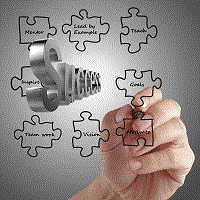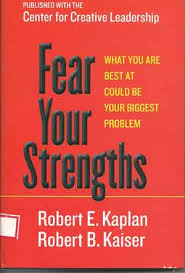
I like to talk. A lot.
My talkativeness has won me business, forged friendships, and been the bedrock of my career.
My talkativeness has also made me overbearing, ruined relationships, and been my Achilles heel in almost every role I’ve played.
As with most people, my greatest strengths are also my greatest weaknesses.
In her Psychology Today cover story, When Virtue Becomes Vice, Mary Loftus writes, “The nature of a virtue is that a vice is almost always hidden inside.”

Loftus, the Editor of Emory Magazine writes, “In the newest view of personality, our traits are no longer seen as binary – you are either conscientious or you’re not – but as dimensional, existing on a continuum. Not only does each characteristic fall on spectrum, each holds the grain of its own destruction. “
She cites these examples, “Organized becomes obsessive. Daring escalates to risk. Modest slips to insecure. Confident turns to arrogant, cautious to anxious, persuasive to domineering, friendly to ingratiating.”
We’ve all known people who touted the merits of their best (perceived) traits without realizing that they carried them to such extremes that people found them off putting.
The mother-in-law who trumps the virtues of a clean organized home without realizing that her family finds her obsession annoying.
The boss who prides himself on rigorous quality standards and who never makes an error. This has a chilling effect on creativity because his employees are afraid that any spark of imagination will be quickly critiqued.
Loftus’s piece, which can be read on the Psychology Today blog, describes howto harness with virtues without tipping into the vice.
For example one that strikes close to my heart is what she call Purpose: Passion without Obsession. I’ve always been a person who gets passionate about her cause, but I’ve been known to drive people nuts.
Loftus writes, “Passionate people are memorizing, they embody purpose and meaning in life and work. Being passionate about things feels good, too. It boosts energy,  stamina and drive. It means you care deeply about something beyond yourself to the point of full emersion, which is likely the only way vaccines are invented, symphonies are written, or middle schools acquire great teachers.”
stamina and drive. It means you care deeply about something beyond yourself to the point of full emersion, which is likely the only way vaccines are invented, symphonies are written, or middle schools acquire great teachers.”
Just when I was feeling quite self-righteous about my purpose-driven personality, I read:
“But passion can also crowd out other things of equal importance, place emotion above logic, and lead to burnout. At its darkest it can turn into obsession, a pursuit that dominates all else, and occupies the mind to an alarming degree.”
Robert Vallerand, a professor at the University of Quebec, contrasts healthy passion with obsessive passion. Individuals with healthy passion engage in an activity because they want to. Those with an obsessive passion engage in an activity because they feel they must – say, to prove themselves to an overly critical parent or to capture the market before anyone else does.
The same scenario applies to other virtue/vice situations.
Are you agreeable to the point of no opinion?
Do you demand excellence to the point of perfectionism?
Do you strive to be so fair that you constantly keep score and leave no room for nuance?
In Fear Your Strengths, Robert Kaiser and Robert Kaplan write, “Show us a  strength, and we’ll show you an example where its overuse has compromised performance and probably even derailed a career.
strength, and we’ll show you an example where its overuse has compromised performance and probably even derailed a career.
Here’s my litmus test: If more than one person complains about it, and they do it more than one time, it’s time to take a hard look in the mirror.
Don’t let your strengths become your undoing.
Comments are closed.